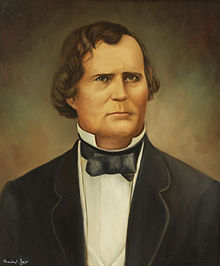Madison S. Perry
This article needs additional citations for verification. (January 2013) |
Madison Starke Perry | |
|---|---|
 | |
| 4th Governor of Florida | |
| In office October 5, 1857 – October 7, 1861 | |
| Preceded by | James E. Broome |
| Succeeded by | John Milton |
| Member of the Florida Senate | |
| In office 1850 | |
| Member of the Florida House of Representatives | |
| In office 1849 | |
| Personal details | |
| Born | 1814 Lancaster County, South Carolina |
| Died | (aged 50–51) Rochelle, Florida |
| Political party | Democratic |
| Spouse | Martha Peay Starke |
| Military service | |
| Allegiance | |
| Branch/service | |
| Years of service | 1861–63 |
| Rank | |
| Unit | |
Madison Starke Perry (1814 – March 1865) was the fourth Governor of Florida.
Early life
[edit]Madison Starke Perry was born in Lancaster County, South Carolina, the youngest child of Benjamin Perry and his wife Mary Starke. He attended South Carolina College, where he was a member of the Euphradian Society.
He came to Florida in the 1830s and became a leader among the area's plantation owners.[1] He was elected in 1849 to represent the county in the Florida House of Representatives. The following year he was elected to the Florida Senate.
Perry as governor
[edit]Perry ran for and was elected governor in 1856, assuming office on October 5, 1857. As Florida's fourth governor, Perry helped bring about the settlement of a long-standing boundary dispute with Georgia and encouraged the building of railways in the state. During the years before the Civil War, Governor Perry foresaw the possibility that Florida might secede from the Union, and in 1858 he urged the reestablishment of the state's militia. Florida did secede three years later, on January 10, 1861. Perry then called for the evacuation of all federal troops from Florida, intending to replace them with the militia.
Last years
[edit]After his term as governor ended on October 7, 1861, Perry served as colonel of the 7th Florida Infantry Regiment until illness forced his resignation on April 30, 1863. He retired to his plantation in Rochelle, where he died in March 1865, shortly before the end of the American Civil War. Survived by his wife and two children, he was buried in Oak Ridge Cemetery in Rochelle.
The city of Perry, Florida, is named in his honor.[2] The city of Starke, Florida, may have been named in his honor.[3] Madison County is named after President James Madison.
Notes
[edit]- ^ "Madison Starke Perry - Florida Department of State".
- ^ The official web site of the City of Perry, Florida states: Perry, Florida was first called Rosehead and information was unavailable as to how this name was chosen. In 1875 it was changed to Perrytown, after Governor Stark Perry. Later the "town" was dropped and the name became Perry." "City of Perry, Florida". Archived from the original on August 9, 2010. Retrieved October 26, 2011.
- ^ The official web site of the City of Starke, Florida states: "George W. Cole, a land speculator and developer, attracted here by the prospects of growth following arrival of the railroad, obtained title to a 40-acre tract on both sides of the railroad for a reputed $100. This section of land is still known in legal description as 'The Original Town of Starke.'...One legend has it that the post office was given the name of Starke in honor of Mr. Cole's Fiancée, whose family name was Starke. Another account has it that the town was named in honor of Madison Starke Perry, Governor of Florida from 1857 to 1861. No one actually knows which version of the naming is correct." "The City of Starke Florida". Archived from the original on December 4, 2011. Retrieved September 11, 2015. The Florida Department of State, Division of Historical Resources adds that the city may have been named after "Thomas Starke, a slaveholder who once owned much land around the area." http://www.flheritage.com/facts/reports/names/city3.cfm#S
External links
[edit]- American people of Welsh descent
- Democratic Party governors of Florida
- People of Florida in the American Civil War
- 1814 births
- 1865 deaths
- People from Lancaster County, South Carolina
- American city founders
- People from Alachua County, Florida
- Confederate States of America state governors
- 19th-century members of the Florida Legislature

